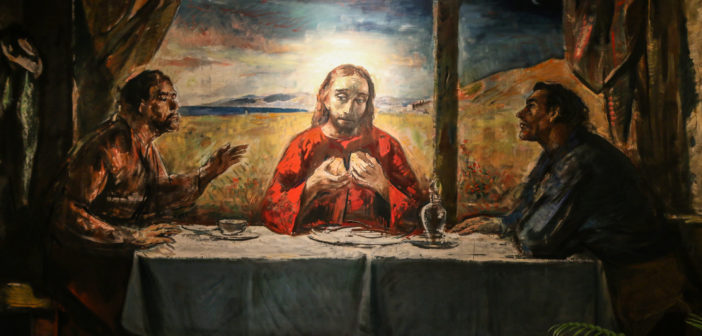The historical Jesus, as I’ve argued elsewhere, was clearly vegetarian. To recap: (1) The controversy in the early church over vegetarianism shows that the leadership of the early church promoted vegetarianism and opposed animal sacrifice. (2) The testimony of later Jewish Christianity echoed and preserved this vegetarian, anti-sacrifice tradition. (3) Jesus himself was killed after disrupting the animal sacrifice business in the temple.
But can we say that Jesus was a vegan? This is somewhat trickier.
Most non-elite people in the Mediterranean in ancient times ate a vegan diet most of the time out of necessity. The main exception would be at festival times when animals were sacrificed and eaten. But we know that Jesus didn’t like animal sacrifice; his opposition to animal sacrifice was what got him killed. Dairy products and eggs were fairly uncommon in the ancient world, except among the elite classes, and Jesus was definitely not part of the elite class. So we can say that even with no direct historical evidence one way or the other about his diet, the historical Jesus probably never ate dairy products or eggs.
What about other animal products? James, the brother of Jesus, didn’t wear wool (according to Hegesippus). So James, at least, avoided at least one animal product.
Honey is more problematic. Jesus (in some versions of Luke) is presented as being offered honey after his resurrection (Luke 24:42-43), though this story is implausible as straight history. In the New Testament, John the Baptist eats locusts and honey. While the Ebionite (Jewish Christian) gospel rejected the idea of John the Baptist eating insects, they did think John ate honey. So that Jesus ate honey is hardly proven, but does seem possible.
The most serious problem for Jesus’ veganism is the use of animals for labor. In the ancient world, there was widespread use of animals for transportation and agriculture. Jesus is casually depicted as riding into Jerusalem on a donkey (e.g. Matthew 21:1-11).
What do we do with this story? We could argue that this is a later myth created after the fact, but do we therefore think that he never rode on a donkey? Or that he, or his family, never ate food grown with the help of animal labor? We might imagine Jesus walking everywhere, but it’s a bit of a stretch to see Jesus inquire about food offered to him, “Was animal labor used in growing this food?”
Proverbs 12:10 says, “A righteous man cares for his beast, but a wicked man is cruel at heart.” This animal-friendly verse, however, presupposes a world in which humans are dependent on their “beast” for labor and transportation. Because this use of animals was so common, we could plausibly ask whether anyone before the industrial revolution was a strict vegan. So when Jesus rides into Jerusalem on a donkey, does this prove that Jesus was not vegan?
We could plausibly appeal to the modern definition of veganism by the Vegan Society, which stipulates that we do not exploit animals “as far as possible and practical.” It was probably not possible or practical to avoid using animal labor in ancient times. Perhaps the best Jesus (or anyone else) could do would be to treat animals as fellow laborers in their household and to “care for their beast.”
There is a sharp contrast between the origins of the concepts of vegetarianism and veganism. Even though the word “vegetarian” comes from the 19th century, the concept of vegetarianism is clearly very ancient. This concept goes back to the beginnings of philosophy (Pythagoras) and religion (Mahavira). It’s not hard to find ancient authors who complained about the eating of animal meat. But the concept of veganism is completely modern. It arose only after the advent of fossil fuels and farm machinery.
It’s much more difficult to find people in ancient times who were not only against eating meat, but also against dairy products, eggs, or honey. Porphyry, a third-century neo-Platonist philosopher, and an obscure Arab poet, Al-Ma’arri (10th-11th Century), are two of whom I am aware who at least raise the issu. There were some ancient injunctions against animal cruelty. For example, the verse from Proverbs cited above, the cow-cult in Hinduism, and the first precept of Buddhism, which (in some translations) enjoins us not to injure any sentient being.
These principles, though, seem to presuppose that humans will naturally use animals for some purposes, and only ask that this use be compassionate. This is a key reason why you often see lists of “famous vegetarians” that go back in time to ancient Greece, China, and India, but any list of “famous vegans” comes almost entirely from the 20th and 21st centuries.
We should be hesitant to hold people in ancient times to an impossible modern standard of ethical behavior. We should also be careful about condemning people in modern times who use animals for labor or transportation, when they live in poorer areas of the world where these are the most practical ways to get around or get things done. Finally, it is possible that in some post-collapse era of limited energy supplies, using animals for agriculture may again become a practical necessity.
If you are willing to countenance eating honey, it is quite probable that Jesus ate a vegan diet; and even if you aren’t, it’s still quite possible. If you are also willing to accept using animals for labor in ancient times on the grounds that totally avoiding animals was not practical or possible, then we can say that Jesus was vegan.
But we should remember that veganism is a modern and ambiguous concept. At its heart, ethical veganism is not about purity; it’s about compassion.
This was originally posted on the Compassionate Spirit blog.
Featured image: a painting of the Supper at Emmaus, on display in the USCCB building in Washington DC. Image credit Lawrence OP, CC BY-SA 2.0.







1 Comment
It is most probable that John the Baptist did not eat locusts. Most likely he ate the fruit of the locust tree.